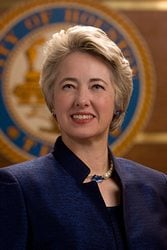
Helena Handbasket: One Bizarre Year In the Life of Houston’s Strangest Politician
In 2011, an unknown candidate named Helena Brown won a seat on Houston’s City Council. One year later, Brown is more mysterious than ever.
A version of this story ran in the December 2012 issue.
In November 2011, the residents of Houston’s City Council District A went to the polls to elect their representative to City Hall. District A comprises the city’s Spring Branch area, a multiethnic blend of working-class and middle-class homes, townhomes, and apartments, poised for economic growth but struggling with traffic, drainage, and public-safety concerns. In other words, Spring Branch residents need real representation. What they elected, instead, was Helena Brown.
Unknown in city politics, Brown came to represent 200,000 Houstonians after she lucked her way into a runoff against an unpopular incumbent in an election with just 8-percent turnout. The voters who did show up were of the oldest school and the furthest right, a group pissed off at incumbent Brenda Stardig.
Brown campaigned as a strict fiscal conservative, promising to halt crazy city spending. Houston blogger Charles Kuffner wondered presciently, “It will be interesting to see how CM-Elect Helena Brown reconciles her professed political beliefs with the sort of things that constituents tend to expect to get done. Maybe there is such a thing as a Republican pothole.” Or not.
What happened next is an argument for the one thing nobody ever says they want: politics as usual.
When she took office, Brown made waves for her nearly satirical level of budget hawkery. She made simplistic government-bad, free-market-good speeches that evoked The Colbert Report to justify voting against funding meals for the elderly, storm sewers, and fire trucks. Then people started to get wind of the weirdness. Brown, 34, still lives with her parents. She proposed fixing the city budget deficit by defaulting on the city’s pensions and tax bonds, and by outsourcing emergency services. And she allegedly tried to get a staff member to take medical leave because Brown was worried she’d be liable for complications with the staffer’s pregnancy.
In this way, Brown’s story is a corrective to the perennial Hollywood myth of the everyman candidate, the Mr.-Smith-Goes-to-Washington type, the underdog who beats the odds and refuses to cave to the establishment, thus changing the game forever. What that fantasy looks like in reality, playing out week after week in Houston City Council meetings, is agenda items passing 16 to 1, with Brown’s vote the lonely, irrelevant “no.”
But Brown’s is also a mystery story. The more attention you pay, the murkier it gets. The smidgen of professional history available about her turns out to be less than true. She’s been involved with radical Catholic groups whose beliefs fall between esoteric and fringe. And then there was her trip to Korea—a trip she paid for with public funds, though it’s not clear whether she was conducting city business or why she went in the first place. Back in Houston, much of her staff quit a few months into her term, and her volunteer “chief advisor” is a disgraced financier whom some believe secretly directs her council votes. Explanations for these mysteries haven’t been forthcoming; Brown never answers media questions after City Council meetings, and rarely grants interviews.
In a state full of wingnut politicians, Helena Brown stands out. It’s not that she’s the most extreme or conservative or outspoken, or even the most incompetent yahoo in public office. It’s that, unlike her confederates, there’s no apparent method to her madness. She’s not following the money, building coalitions to help her climb some ladder, or even adhering to a particular party. She’s fumbling forward, drawn on by a voice only she can hear.
The Faithful
At first, Brown seemed like a tea-party dream come true. She was native, having lived in District A almost her whole life. She was active, volunteering for local Republican campaigns and serving as precinct chair since she was 18. But she had also never held elected office, so she wasn’t a loathed “politician.” Brown described herself as “Christ-centered” and her campaign pledge was to be “responsive and responsible,” fighting city spending and returning every constituent phone call.
David Jennings, who writes the Houston Chronicle’s conservative political blog Big Jolly, also complained that Stardig ran “the nastiest of nasty campaigns, with anonymous emails disparaging her opponent with everything from ‘she’s never had a job’ to … ‘did you know she’s a member of a strange Catholic church?’” Jennings added, “[It’s] always amazing to see the depths that an incumbent will sink to when they cannot defend their record.”
Yeah… About that…
Brown is a true believer. She and her staff have worked hard to obscure her history, but when you assemble what little is available about her past, you see a woman who’s spent her life fighting sporadically and ineffectually for causes—first extreme Catholicism, then extreme conservatism—in search of her purpose.
Brown was home-schooled by her parents and graduated from a local Catholic university in 2001. That’s also the year she founded a nonprofit called Turris Davidica to help the needy and distribute Catholic media.
It’s not clear what, if anything, Turris Davidica did between 2001 and 2010, when it defaulted on its charter. But in February 2011, Brown registered the website turrisdavidica.com and used it to sell CDs and DVDs by Michael Voris, a Catholic extremist so fringe that the church asked him to stop calling himself Catholic. (In response, Voris changed his website’s name from RealCatholicTV.com to ChurchMilitant.tv.) Voris thinks, for example, that only Catholics should be allowed to vote, and that liberal elites invented global warming to justify a campaign of eugenics via birth control. The Internet was made for this guy.
Maybe Brown liked Voris in spite of his zanier theories, but maybe not. In the summer of 2011, Brown was active in a private Internet group called “Friends of Freedom.” The Houston Chronicle published one of Brown’s postings in which she mused that, historically, “even assumed enemies were friends in secret and worked toward the same objectives, like Hitler and Stalin.” Brown, who has a B.A. in history, explained that Hitler and Stalin’s friendship gave rise to the United Nations, “whose leaders have all been communists. Both were Communist freemason [sic] of Khazarian Jewish origins.”
When the Chronicle asked Brown about the post, she said she hadn’t been speaking literally.
Turris Davidica perished without assets. But according to its articles of incorporation, if the nonprofit had had any assets, they would have been divided between two orphanages: Our Lady of Victory Homes of Charity in Lackawanna, New York—which exists—and the Servants of Jesus and Mary for the Society of the Child Jesus Orphanage in Constable, New York—for which we could find no records.
But who among us hasn’t founded an online nonprofit to distribute media by religious extremists and give money to little-known/imaginary Northern orphanages? We were all young once.
Except that Turris Davidica wasn’t Brown’s only foray into fringe Catholic organizing. In May 2011, someone registered a website for a Houston branch of the Militia Immaculata, a century-old evangelical Catholic movement founded to convert Freemasons. (Remember the thing about Hitler and Stalin being Freemasons?) Though Brown’s name doesn’t appear on the site, it’s registered to “T D,” and shares a phone number and post office box with helenabrown.com. (Brown uses that same P.O. box as her campaign office mailing address.) The group, which meets at a small church in District A, proclaims on the website that its aim is to “convert sinners, heretics, schismatics, Jews, etc., and especially the Freemasons.”
The Cipher
While Brown’s religious endeavors seem unusual, the true mystery surrounding Helena Brown may be her job experience—or lack thereof.
Brown’s biography on the City of Houston website says she “Worked in City Government at Bunker Hill Village,” a 3,800-person neighborhood in District A. While campaigning, Brown elaborated to thevoterguide.org that during this unspecified tenure, she “gained experience in all aspects of city government.” That would have been a trick, because Brown served Bunker Hill for about a year, in 2007, as a part-time receptionist, according to the Bunker Hill Village city administrator.
Helenabrown.com claims Brown is president of the Moritz Village Townhomes Association, while the city website says she’s a former president. But according to the Texas Secretary of State’s office, neither is true. Brown is listed on association documents as a member-at-large and has been since 2007.
Brown’s bio says she is a cofounder of the Pachyderm Club of Northwest Houston, but its actual founder, Earl Lairson, told citizen journalist Mike Knox that Brown was merely among the group’s original members and served briefly as VP of communications.
So what was Brown doing for the 10 years between graduating from college and being elected to represent hundreds of thousands of Houstonians? Hard to say.
Brown’s bio calls her a “Business professional with 10 years of experience in administration, marketing, and technology.” But unless you count registering websites, that doesn’t appear to be true. When Knox asked Brown supporters about the 10-year claim, they pointed to her work as Republican precinct chair. Precinct chairs are responsible for getting out their party’s vote within their area. Brown’s precinct, 577, covers about 13 blocks.
The Antagonist
OK, so Brown is “a member of a strange Catholic church” and has (almost) “never had a job,” as Brenda Stardig’s campaign alleged. Jennings, the Chronicle blogger, called those “non-issues” when endorsing Brown, and maybe they are. But they previewed the culture of secrecy, paranoia and half-truth that would characterize Brown’s first year in office.
Less than two weeks into her term, Brown horrified activists in her district by supporting the sale of an 8,800-square-foot tract of land near an elementary school to an auto body shop. Citizens had been trying for years to turn the land into a park, and the much-maligned Stardig had successfully opposed the plot’s sale the previous year. Brown characterized her vote as pro-business.
This was but a foretaste of drama to come.
During her first year in office, Brown voted against hundreds of agenda items, many of them projects in other members’ districts. Among the nays: repairing an airport runway; building storm sewers; funding an after-school program; reducing lead hazards; providing the homeless with transportation to medical care; offering HIV screenings; repairing roads; buying vehicles and equipment for the Houston Police Department; offering training and job placement to developmentally disabled adults; housing AIDS patients; feeding the elderly; cleaning swimming pools; and renovating a shelter for abused women and children. That was just through mid-March.
Brown often voted alone. During her first six months in office, she cast the solitary “no” vote a staggering 206 times.
Brown’s votes were eye-rollers, but they had little impact. More annoying to colleagues were her frequent “tags,” a parliamentary maneuver that delays votes for a week. By March, Brown had tagged so many items of vital business that the Council started overriding her, a rare breach of decorum, but the Council was fed up.
In addition to tags and no votes, Brown started picking fights with her peers. While voting against a denial of electric-rate increases in Mike Sullivan’s district, Brown opined that Sullivan’s constituents “do not believe in the regulation of rates of businesses. That’s communism.”
Sullivan, who pre-Brown was the council’s most conservative member, seemed incredulous to find himself uttering, “I am not a communist.”
While no one was immune to attack, Brown most often threw down against Mayor Annise Parker. Two months into her term, Brown tried to replace one of Parker’s appointed volunteer city board members. The mayor publicly admonished Brown, adding that she had refused to meet Parker to discuss the issue privately. Brown replied, “Mayor, I will not be bullied. … I specifically asked for specifics so I can decide whether the meeting is to be merited.”
This reticence to meet one-on-one or interact spontaneously is a theme. Brown rarely responds to media inquiries. When she denounces agenda items, she reads from prepared remarks. But who prepares them?
The Boss
From the beginning, Brown made controversial staffing choices. She employed seven people, but only part-time, denying them city benefits like sick days and health insurance. When word broke in the Chronicle that five of her staffers worked 39 hours a week, Brown called it fiscal responsibility and insisted they’d been offered health insurance but declined, preferring the free market.
In March, one of Brown’s employees resigned. In April, her chief of staff and chief deputy director followed. Only in July did the public learn that the April resignations coincided with an incident in which Brown allegedly tried to coerce a staff member to take medical leave for a pregnancy. No one knew why, but the staffer told the Chronicle that she thought Brown “didn’t want to have any liability if something went wrong.”
Incredibly, none of this is the most troubling part of how Brown governs.
In July, a Houston Press cover story by Terrence McCoy made the case that Brown’s volunteer chief adviser, William Park, “appears to dictate her office, and some say her life.”
Park was once CEO of a brokerage firm called United Equity Securities that, among other things, sold shares in what turned out to be a Ponzi scheme. Park denies all wrongdoing, but the Press tracked down 17 financial victims from his past. And in April 2011, the Financial Industry Regulatory Authority banned Park from the investments industry for failing to pay more than $130,000 to a woman—by some accounts, his ex-girlfriend—who successfully sued him for breach of contract, according to the Press.
Brown met Park at a tea party rally five years ago, but those closest to her say they’d never seen Park until Brown took office. Suddenly, she was changing votes at the last minute, and her public diatribes sounded nothing like her. Her staff was baffled.
But it wasn’t hard to guess what happened. Park was vocally religious and persuasive for a living. Brown was sheltered and in over her head. Park, with his white cowboy hat and gold crucifix ring, got to know Brown, and within a few months, was allegedly overheard talking about Brown’s votes in the first person, as if he, Park, were on City Council, the Press reported.
In March, Brown hired Enrique Reyes as communications director. Reyes had worked for Park at United Equity Securities, and former staff members told the Press they felt Reyes was Park’s spy. The next month, Brown’s office hemorrhaged employees. Reyes was promoted to chief of staff.
The Sucker
While Brown railed against public spending on, say, AIDS prevention, records obtained by the Chronicle show she tried to get city money for a few less noble causes. Brown sought and was denied reimbursement for: a private attorney she hired to sit in on meetings with herself, the mayor, and her city-provided attorney; 13,000 magnets deemed political advertising; and $2,108 in gas purchased by Park.
But a single event in Brown’s tumultuous first year eclipses all the others in its weirdness and expense.
From June 30 to July 7, Helena Brown and William Park went to Asia. Originally, Brown had been invited to visit South Korea with Houston Airport System Director Mario Diaz, to promote direct flights between Houston and Seoul. But when the Korean Air representative they were supposed to meet with canceled, Diaz called off his trip.
Brown didn’t. Using $11,000 in public money, Brown jaunted around Taiwan, China and Korea, meeting no airline officials and attempting to charge the city for Park’s flight as well.
Brown’s district is home to Houston’s Koreatown, so perhaps she considered the outing research. Or maybe something else was at play. According to the Press and Korean Journal, just before their trip, Brown and Park solicited donations, through email and in person, from South Korean businesses in District A, requesting that donations be made directly to Brown—a violation of city law. When asked about the legality of direct donations, Park reportedly said, “Councilwoman Brown has very powerful lawyers to help.”
Having tried for weeks to get an interview with Brown for this piece, I finally met her at a neighborhood board meeting on drainage issues in her district, held at an HEB supermarket. Brown, pale and cherubic, declined to speak in the meeting but sat through its three hours. Over her shoulder, her new chief of staff filmed the whole thing with his phone.
When the meeting ended, Brown greeted me kindly and, after asking what questions I had, agreed to sit with me in a booth in the HEB deli for a few minutes. Reyes sat beside her and tried to look probing but quickly got bored and started doodling on his yellow pad.
Brown didn’t want to talk about the controversies of her first year. But she did share one revealing insight: She never wanted to run for office.
“I prefer to be in the background,” she said. “I was definitely not interested in serving in that capacity, but we needed someone to be responsive to the constituents.” Deciding to run, she said, was “like bungee jumping.” But then, for the first time, Brown felt purposeful.
“It wasn’t until I started going to civic club meetings and visiting constituents that I was like, all of a sudden I became totally into this. I understand my role, my responsibilities.”
Despite her tough year, Brown says she’s planning to run for re-election. Beyond that she won’t speculate. “I wasn’t one of those kids who ever planned,” she said. “I very much was and still am a que sera, sera person. What will be will be.”

